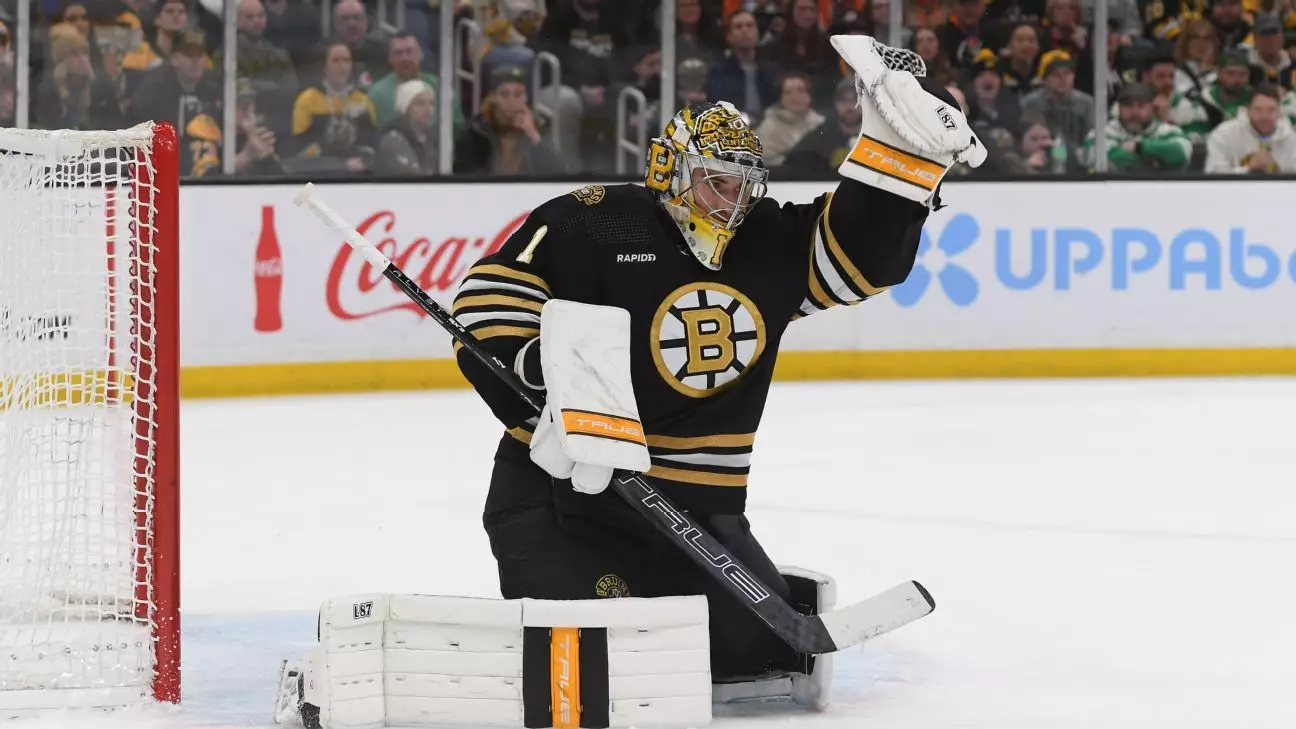In the world of professional sports, few circumstances are as fraught with tension as a contract negotiation between anathlete and their team. This is currently exemplified by the case of Jeremy Swayman, a talented goaltender for the Boston Bruins, who finds himself caught in the crossfire of a contentious contract dispute. The stakes are high for Swayman, a restricted free agent who has publicly expressed his desire to remain with the team, and the ongoing discord between him and Bruins management raises questions about both parties’ intentions as the new NHL season looms.
Swayman recently made an emotionally charged appearance in a docuseries titled “FACEOFF: Inside the NHL,” where he candidly shared his aspirations and fears regarding his future with the Bruins. “I don’t want it to end,” he stated, alluding to the potential finality of his tenure with the team. For many athletes like Swayman, who have dreamed of playing for their childhood teams, such declarations resonate deeply. The pressure of reconnecting with one’s roots while navigating professional obligations can often create a culture of conflict that is difficult to resolve.
The Bruins deemed Swayman their primary starting goaltender when they traded away Linus Ullmark, but they have yet to cement his future with a new contract. Such delays can lead to escalating tensions, particularly when a player opts out of training camp, a move that Swayman has made in protest against the lack of an agreement. His absence inadvertently positions Joonas Korpisalo as the likely starter for the Bruins’ upcoming season, a fact that underscores the urgency for both sides to reach an accord.
Team President Cam Neely’s comments on Swayman’s asking price indicate a disconnect between the player’s expectations and the organization’s willingness to meet them. This discrepancy is not merely a question of numbers; it serves as a reflection of differing values assigned to the player’s contributions. The Bruins’ dilemma might stem from Swayman’s mixed playoff performances over past seasons, which have sparked some skepticism among the team’s leadership. Swayman acknowledged the difficulty of the arbitration process earlier this year, where he was awarded a contract but faced criticism that shook his confidence.
Swayman’s candid examination of past grievances he faced during arbitration illuminates a poignant reality in professional athletics—the psychological toll that such negotiations can impose on young players. He recalled the harsh evaluations he received and has now made it a point to address them through personal benchmarks, reminding himself of past criticisms while seeking to improve. This level of introspection reveals a more profound understanding of how performance shapes an athlete’s career trajectory.
“Check,” Swayman mused, referencing his self-imposed checklist of criticisms, especially the assertion that he was not “trustworthy in the playoffs.” These words hang over Swayman like a spectral reminder of the pressures he must navigate. Notably, during the 2024 postseason, he boasted an impressive record; however, the team’s early exit from the playoffs has fueled ongoing scrutiny. This dynamic illustrates that while personal achievements can be commendable, they are often overshadowed by the team’s results.
As Swayman’s future hangs in the balance, both he and the Bruins are at a pivotal crossroads. His emotional commitment to the franchise is evident, yet the realities of restricted free agency and contract negotiations cannot be ignored. The pathway forward requires prudent decision-making that respects both Swayman’s aspirations and the team’s financial constraints.
With the NHL season set to kick off, the urgency for resolution cannot be overstated. Bridging the chasm between what Swayman wants and what the Bruins are prepared to give will require open dialogue and perhaps some compromises. With a hopeful spirit, Swayman emphasized, “Whatever I can do to help this team win, I know everything else will take care of itself.” Such a mindset could potentially lay the foundation for a fruitful partnership moving forward, should both sides choose collaboration over contention.
Ultimately, this situation encapsulates the intricate dance of professional sports—a realm where talent, negotiations, and human emotions entwine. As an athlete grapples with the complexities of contract negotiations, the heart’s yearnings remain resilient, driving the desire to achieve dreams while impacting the broader narrative of professional hockey.

